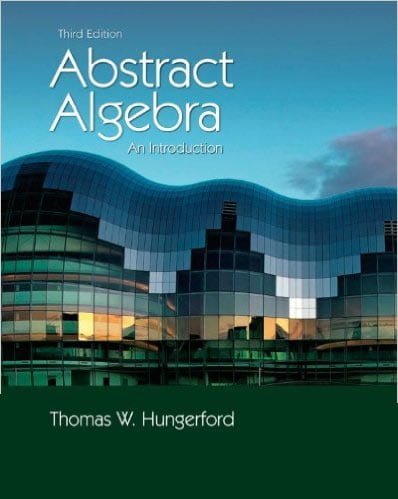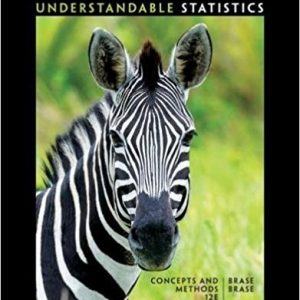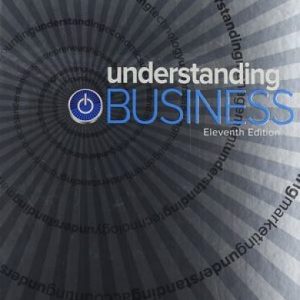This is completed downloadable of Solution Manual for Abstract Algebra: An Introduction, 3rd Edition Thomas W. Hungerford

Product Details:
- ISBN-10 : 1111569622
- ISBN-13 : 978-1111569624
- Author: Thomas W. Hungerford
- ABSTRACT ALGEBRA: AN INTRODUCTION is intended for a first undergraduate course in modern abstract algebra. Its flexible design makes it suitable for courses of various lengths and different levels of mathematical sophistication, ranging from a traditional abstract algebra course to one with a more applied flavor. The book is organized around two themes: arithmetic and congruence. Each theme is developed first for the integers, then for polynomials, and finally for rings and groups, so students can see where many abstract concepts come from, why they are important, and how they relate to one another. New Features:
- A groups-first option that enables those who want to cover groups before rings to do so easily.
- Proofs for beginners in the early chapters, which are broken into steps, each of which is explained and proved in detail.
- In the core course (chapters 1-8), there are 35% more examples and 13% more exercises.
Table of Content:
- Part 1: The Core Course
- Ch 1: Arithmetic in Z Revisited
- Introduction
- 1.1 The Division Algorithm
- 1.2 Divisibility
- 1.3 Primes and Unique Factorization
- Ch 2: Congruence in Z and Modular Arithmetic
- Introduction
- 2.1 Congruence and Congruence Classes
- 2.2 Modular Arithmetic
- 2.3 The Structure of Zp (p Prime) and Zn
- Ch 3: Rings
- Introduction
- 3.1 Definition and Examples of Rings
- 3.2 Basic Properties of Rings
- 3.3 Isomorphisms and Homomorphisms
- Ch 4: Arithmetic in F[x]
- Introduction
- 4.1 Polynomial Arithmetic and the Division Algorithm
- 4.2 Divisibility in F[x]
- 4.3 Irreducibles and Unique Factorization
- 4.4 Polynomial Functions, Roots, and Reducibility
- 4.5 Irreducibility in Q[x]
- 4.6 Irreducibility in R[x] and C[x]
- Ch 5: Congruence in F[x] and Congruence-Class Arithmetic
- Introduction
- 5.1 Congruence in F[x] and Congruence Classes
- 5.2 Congruence-Class Arithmetic
- 5.3 The Structure of F[x]/(p(x)) When p(x) Is Irreducible
- Ch 6: Ideals and Quotient Rings
- Introduction
- 6.1 Ideals and Congruence
- 6.2 Quotient Rings and Homomorphisms
- 6.3 The Structure of R/I When I Is Prime or Maximal
- Ch 7: Groups
- Introduction
- 7.1 Definition and Examples of Groups
- 7.1.A Definition and Examples of Groups
- 7.2 Basic Properties of Groups
- 7.3 Subgroups
- 7.4 Isomorphisms and Homomorphisms
- 7.5 The Symmetric and Alternating Groups
- Ch 8: Normal Subgroups and Quotient Groups
- Introduction
- 8.1 Congruence and Lagrange’s Theorem
- 8.2 Normal Subgroups
- 8.3 Quotient Groups
- 8.4 Quotient Groups and Homomorphisms
- 8.5 The Simplicity of An
- Part 2: Advanced Topics
- Ch 9: Topics in Group Theory
- Introduction
- 9.1 Direct Products
- 9.2 Finite Abelian Groups
- 9.3 The Sylow Theorems
- 9.4 Conjugacy and the Proof of the Sylow Theorems
- 9.5 The Structure of Finite Groups
- Ch 10: Arithmetic in Integral Domains
- Introduction
- 10.1 Euclidean Domains
- 10.2 Principal Ideal Domains and Unique Factorization Domains
- 10.3 Factorization of Quadratic Integers
- 10.4 The Field of Quotients of an Integral Domain
- 10.5 Unique Factorization in Polynomial Domains
- Ch 11: Field Extensions
- Introduction
- 11.1 Vector Spaces
- 11.2 Simple Extensions
- 11.3 Algebraic Extensions
- 11.4 Splitting Fields
- 11.5 Separability
- 11.6 Finite Fields
- Ch 12: Galois Theory
- Introduction
- 12.1 The Galois Group
- 12.2 The Fundamental Theorem of Galois Theory
- 12.3 Solvability by Radicals
- Part 3: Excursions and Applications
- Ch 13: Public-Key Cryptography
- Introduction
- Ch 14: The Chinese Remainder Theorem
- Introduction
- 14.1 Proof of the Chinese Remainder Theorem
- 14.2 Applications of the Chinese Remainder Theorem
- 14.3 The Chinese Remainder Theorem for Rings
- Ch 15: Geometric Constructions
- Introduction
- Ch 16: Algebraic Coding Theory
- Introduction
- 16.1 Linear Codes
- 16.2 Decoding Techniques
- 16.3 BCH Codes
- Part 4: Appendices
- Appendix A: Logic and Proof
- Appendix B: Sets and Functions
- Appendix C: Well Ordering and Induction
- Appendix D: Equivalence Relations
- Appendix E: The Binomial Theorem
- Appendix F: Matrix Algebra
- Appendix G: Polynomials
- Bibliography
- Answers and Suggestions for Selected Odd-Numbered Exercises
- Index
- EP3
- EP4





